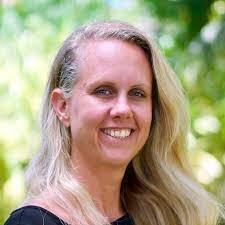By Lisa Kimsey
“Every art communicates because it expresses. It enables us to share vividly and deeply in meanings… For communication is not announcing things… Communication is the process of creating participation, of making common what had been isolated and singular… the conveyance of meaning gives body and definiteness to the experience of the one who utters as well as to that of those who listen.”
― John Dewey, Art as Experience
At the end of their journey in the University of Hawaiʻi at Mānoa (UHM), College of Education (COE), Progressive Philosophy and Pedagogy, MEd Curriculum Studies program, master's candidates applied the process of philosophical reflection to explore the meaning of their experiences in the program. In collaboration with peers and professors they engaged in a creative process to “untangle” and illuminate lessons learned about progressive education during the five semesters of the program. They were asked to communicate their reflections to a wider audience via a thought provoking and artful film that could be shared with a wider audience. The overarching question guiding the reflective process and ultimately the film was: Why progressive philosophy and pedagogy?
To gently guide and support the philosophical reflection process, we used the curriculum and steps below as a pedagogical framework.
Step One: Reflect
What philosophical questions have emerged from your experience in the Progressive Philosophy and Pedagogy program?* Write them down.
Explore possible answers to those questions through introspection, journaling, drawing, reviewing coursework, artifacts from your gallery, etc.
Analyze the answers to your questions and identify emergent themes, insights, and new understandings.
Step Two: Brainstorm and Map Your Film
Identify important themes and/or implications that emerge from your analysis, and brainstorm how you might communicate and express your findings in a digital video format.
What existing artifacts or new materials will you need to illustrate your findings in a film (digital video) format?
Map out a “storyboard” to structure and outline your film (video) narrative and what you are aiming to express.
Step Three: Create the Film
Create a 5 - 20 minute digital film as an original expression of your findings to share with a wider audience.
Make the film public.
At the end of the semester, the master’s candidates produced a diverse array of films, each uniquely exploring the question: Why progressive philosophy and pedagogy? They shared their films with each other, their professors, and colleagues. The dialogue that ensued at the end of watching each film both celebrated all that had been learned and opened doors to new inquiries beyond graduation from the program.
Among the recent graduates of the UHM COE Progressive Philosophy and Pedagogy program is Lisa Kimsey, current Auxiliary Programs Manager at Hanahau‘oli School. As a result of the philosophical reflection process described above, she created a beautiful film expressing her evolving understanding of progressive education through the lens of dance. In the spirit of John Dewey’s Art as Experience, the film she produced illustrates how her journey learning and teaching the art of dance “vividly and deeply” helped to communicate the “why” behind her progressive philosophy and pedagogy. Take a moment and watch her five-minute film here: Lisa Kimsey's Reflection: Why Progressive Philosophy and Pedagogy?
When asked to reflect on making the film, art, dance, and progressive education pedagogy, Lisa concluded:
My life has been this spiral that I thought was about dance, but I am coming to realize was about education and creativity. Itʻs been about creating opportunities for others to discover what brings them joy and what they are capable and competent at. Progressive education opens that door for students. It allows us (we are all learners, all the time) to explore ourselves and our world. It requires us to think critically and deeply about important issues and to take action to make the world a better place. It invites us to be creative and take risks, make mistakes and learn from them. The UHM COE Progressive Philosophy and Pedagogy program helped me know what I had felt intuitively and opened up my understanding of an education system that honors children - celebrates and centers them. I am grateful for the opportunity to join with my colleagues who pushed my thinking and challenged me to know better, do better.
May we all continue, like Lisa, to explore the question: why progressive philosophy and pedagogy? May we use inquiry and dialogue as processes to guide our exploration along the way. May we challenge ourselves to use artistic forms of expression to build community through communication and creative participation. May this process continue to illuminate and articulate the findings of those who seek to know progressive education deeply, as well those who are willing to listen.
Works Cited:
Dewey, J. (1934). Art as experience. Minton, Balch.
ABOUT THE AUTHORS:
Dr. Amber Strong Makaiau is a Specialist at the University of Hawai‘i at Mānoa, Director of Curriculum and Research at the Uehiro Academy for Philosophy and Ethics in Education, Director of the Hanahau‘oli School Professional Development Center, and Co-Director of the Progressive Philosophy and Pedagogy MEd Interdisciplinary Education, Curriculum Studies program. A former Hawai‘i State Department of Education high school social studies teacher, her work in education is focused around promoting a more just and equitable democracy for today’s children. Dr. Makaiau lives in Honolulu where she enjoys spending time in the ocean with her husband and two children.
Lisa Kimsey is the Auxiliary Programs Manager for Hanahauʻoli School where she creates enrichment and summer school programs and an after school camp program. Prior to joining the joyful work of Hanahauʻoli, Lisa was School Leader at SEEQS PCS in Honolulu. Lisa is most proud of founding The Movement Center, a non-profit performing arts school with a goal of making performing arts education available to everybody. Lisa, her wife Caryn, and dog JoJo love to go to the beach and enjoy live theater performances.











